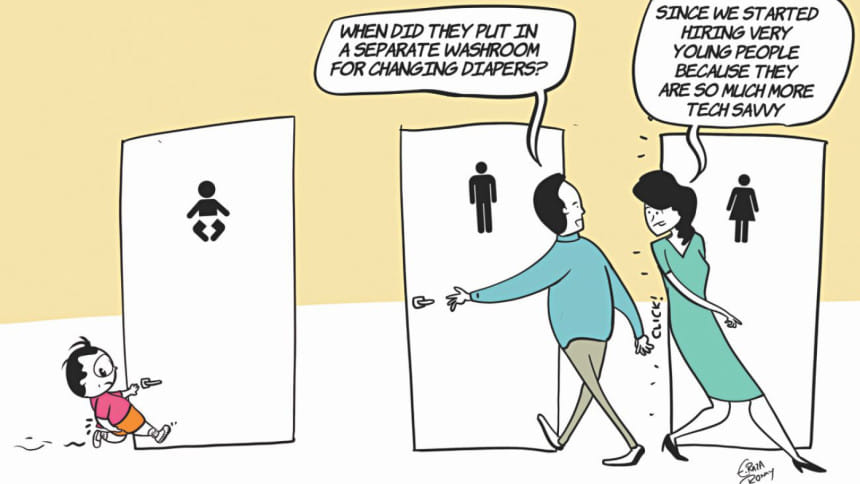ARE YOU OLD ENOUGH TO BE HERE?

"What do people do in offices?" a friend recently asked in a group chat. While the answer to this question seems obvious and one might think you'd have to be a precious Gen Z snowflake to have to ask something like this, my friend is what people would call a Gen Z snowflake. I am too, but because of a combination of good luck, opportunism, and the coincidence of being in the right place at the right time, I happen to have a job and consequently, the answer to my friend's simple-minded question. "We work," I told her. "For the most part," I added.
I may not have thought much about it, but in retrospect, what I meant with the appendage to my answer has certain significance. It is significant to me because despite 'doing the work' being the most important thing about having a job, trying to look in control when quite often I feel like I've been thrown in the deep end, and trying to make myself feel like I belong to an office environment that has been shaped by personalities much older than me takes up a good chunk of effort. These small troubles manifest themselves over the cafeteria table when someone says Wasim Akram was the best fast bowler they've ever seen live. Wasim Akram is old. You'd have to be old to have seen him live.
These conversations are harmless, to be honest, and they mostly end in an inquiry of one's birth year, and an incredulous roll of the eyes. What causes a tad more discomfort is when colleagues fail to take into account how the nature of problems change at different points of a person's life. For example, getting home before 8 PM is something that is generally more important for a younger person than for someone who's older. Being aware of that is vital if you are the person responsible for maintaining a schedule, and also older.
Everyone tends to think life used to be easier five or ten years ago, but you didn't know this when it mattered, which was five or ten years ago. I'd be lying if I said that over the years, I haven't been telling my juniors at school and college that their SSC grades, and then their HSC grades, and then the university they get admitted to doesn't really matter in the long run. Yet, at the workplace, when someone tells me life is about to throw me curve balls much worse than the ones I faced in my latest final exams, it is not reassuring. I think this is a human condition, a type of long term amnesia that disables our ability to empathise, something that we'd all be better off without.
On the flipside, you can be overly aware of someone's age at the workplace as well. Most late teens and twenty-somethings will attest to having had to deal with overbearing parents and for the ones who get an early taste of the real world at a workplace, the freedom to make some choices by themselves for the first time ever is everything. At a workplace, you are asked to make impactful decisions, and it takes a fair bit of mental acrobatics to convince yourself that you can make these decisions. Yet, undue suggestions for a decision that should be solo, or simply bypassing a young colleague in decisions that'd require collective input can leave a terrible mental mark. When you're the young person at work being asked for the fifth time whether you're sure you can do something (that you're supposed to do yourself) by yourself, you have to pinch yourself to not shout, "I'M OLD ENOUGH TO MAKE MY OWN DECISIONS, DAD!", because an outburst like that may lead to never ending taunts, and for the unlucky, to workplace bullying. Which brings me to my final point.
Banter at the workplace is an inseparable part of that particular workplace. It's how colleagues develop a good rapport because you seldom have the time or openness to just sit down and talk about each other. But what's banter to one person could be bullying to another, especially if it's a person whose personality does not dictate them to come up with replies on the spot. A person may feel insulted simply due to a lack of understanding about the tone of a comment. This problem is definitely not limited to people of a younger age, but if someone is already feeling intimidated because of some other factor, age being one of them, they're far more likely to come out feeling humiliated in situations like these.
The nature of most industries has become such that more and more university students, maybe even freshmen, are starting to enter workforces. These people enter workplaces where almost everyone is older, and it's important for these older people, when the situation arises, to not raise the eyebrow that asks, "Are you old enough to be here?" but to do their best to accommodate someone who's probably feeling hopelessly out of place.

 For all latest news, follow The Daily Star's Google News channel.
For all latest news, follow The Daily Star's Google News channel. 



Comments